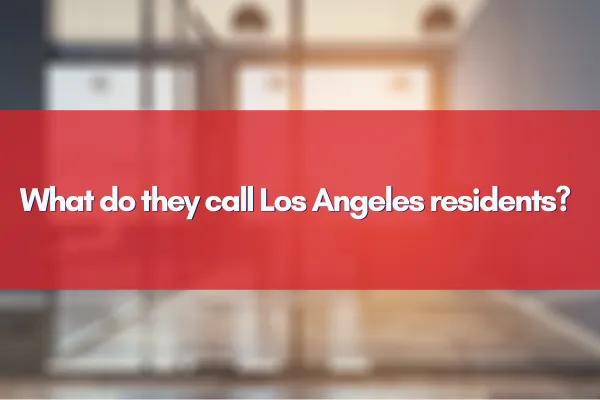How Much Is Your Home Worth?

What do they call Los Angeles residents?
What Do They Call Los Angeles Residents?
If you've ever found yourself strolling along Venice Beach or navigating the bustling streets of downtown, you might have caught yourself wondering, what exactly do they call the people living in Los Angeles? Ask around, and you’ll probably hear the term “Angelenos” tossed around like a well-worn surfboard at Malibu. But is that the only correct term? And where did it come from anyway? Today, we unpack this intriguing small but colorful piece of Los Angeles, CA identity, all the while revealing why knowing this little nugget makes you sound like a local pro.
What Are Los Angeles Residents Called? The Definitive Answer
The simplest way to answer the question, “what are Los Angeles residents called?” is to say: they are called Angelenos (pronounced an-juh-LEE-noh). According to Merriam-Webster, Angeleno is a noun for a resident or native of Los Angeles, California.
Plural: Angelenos (or sometimes Angelinos)
Origin: Derived from the city’s original Spanish name, El Pueblo de Nuestra Señora la Reina de los Ángeles (The Town of Our Lady the Queen of the Angels).
If you want to impress someone in a trivia contest or sprinkle some local flavor into your conversation, drop “Angeleno” with confidence—it’s the official and widely accepted demonym.
Fun Fact: The Word 'Angeleno' Is Spanish in Origin
If English were Angeleno’s ancestry.com, it would trace back through Spanish roots. Los Angeles was originally a Spanish pueblo (called El Pueblo de Los Ángeles) founded in 1781. The name literally means “The Angels”, hence the derivative nickname for residents, Angelenos.
Not Just One Name: Other Terms for Los Angeles Residents
While “Angeleno” is king of the hill, other nicknames sometimes pop up:
Angelino: A less common variation but occasionally heard, more informal. (Many locals prefer Angeleno.)
LA locals or simply locals: Casual terms used by residents or outsiders talking about people from LA.
But here’s a tip: using “Angeleno” in writing or more formal conversations lands you bonus points for accuracy and cultural respect.
Why Does the Name Matter? More Than Just a Label
This might sound trivial—after all, a rose by any other name… right? But names like Angeleno carry a punch of identity and belonging that lights up the pulse of Los Angeles, CA residents. Let’s see why:
Cultural Pride & Identity: Angelenos wear their badge with pride. The term reflects a vibrant, diverse population that’s deeply connected to the city’s history and lifestyle.
Global Recognition: When someone says “Angeleno,” people immediately think Hollywood, beaches, innovation, and that enviable SoCal vibe.
Regional Branding: From tourism to business, “Angeleno” serves as a way to uniquely identify people contributing to LA’s economy and creative talent pool.
Case Study: Angeleno Identity & Hollywood Culture
Hollywood is undeniably the jewel in LA’s crown, with the entertainment industry pulsing through its veins. Many actors, creatives, and entrepreneurs embrace being Angelenos because it connects them to a history of dreams, hustle, and epic stories. The word embodies not just residency but being part of a world-famous culture built on creativity.
Who Are the Angelenos? Breaking Down Demographics
Knowing the term is interesting, but understanding who Angelenos really are is what adds true depth:
Population Size: Los Angeles, CA is the 2nd most populous city in the U.S., with nearly 4 million residents.
Diversity: Over 140 languages are spoken, making it one of the most linguistically diverse cities worldwide.*
Ethnic Makeup: Latino (about 48%), White, Asian, African American, and many more backgrounds create a cultural mosaic.
Age Range: From young startup founders in Venice to retirees sipping coffee in Pasadena, Angelenos cover all age groups.
How to Sound Like a Real Angeleno
Got guests from out of town? Or thinking of moving to LA? Here's a mini crash course on what real Angelenos sound like when they talk—and call themselves:
Pronounce it an-juh-LEE-noh. Stress on the third syllable.
Use the plural Angelenos when speaking about more than one resident.
Avoid “Angelino” unless you’re going for playful or informal tone.
Toss in references to city landmarks and cultural icons—Hollywood, Santa Monica Pier, Dodger Stadium—to show your local chops.
Throwing in “Angeleno” is like saying, "Hey, I get what makes this city tick!"
FAQs About Los Angeles Residents
Q1: Are Angelenos only people born in Los Angeles?
Not at all. Angeleno refers to anyone living in Los Angeles, CA—whether born there or a transplant who has made the city their home.
Q2: Is there another name for people from Los Angeles County?
People from Los Angeles County could be called Angelenos if they live in the city of Los Angeles itself. Residents in other cities like Long Beach or Pasadena are called by their city name residents.
Q3: What is the difference between Angeleno and Angelino?
Angeleno is the officially recognized term, while Angelino is more informal and less commonly used.
Q4: Do other big cities in California have special resident names?
Yes! For example, residents of San Francisco are called San Franciscans, and people from San Diego are called San Diegans.
Embracing the Angeleno Spirit: More Than Just Words
Here’s the secret sauce—what makes being an Angeleno legendary isn’t just about the name; it’s the vibrant lifestyle that name represents. From surfing at sunrise to late-night taco trucks, standing in traffic on the 405, or chasing dreams at LA Film School—Angelenos share an uncanny blend of resilience, ambition, and laid-back coolness.
It’s about fearless diversity and innovation, finding art in street murals, and getting your caffeine fix at a quaint local café before hitting the sprawling freeways. So when you call someone an Angeleno, you’re not just describing where they live; you’re nodding to their creativity, culture, and spirit.
Explore More About Los Angeles with Grace Globus
If you’re curious about embracing the Angeleno lifestyle or thinking about making LA your home, let’s chat! From guides to neighborhoods, schools located in districts like LAUSD (check GreatSchools.org for rankings), and real estate insights, I’m here to help you navigate this incredible city.
📞 Contact: Grace Globus
📍 Title: Realtor
📲 Phone: 310-779-0058
📧 Email: [email protected]
🌐 Website: https://gracesellsla.com
Whether you're an Angeleno already or aspiring to become one, knowing what residents of Los Angeles, CA are called is just your first step into a rich and dynamic city culture. Go ahead—say it loud and proud: I'm an Angeleno! And, don’t forget to share this blog with fellow LA fans or drop a comment if you have your own favorite local terms or stories.
Because in LA, every story counts.




